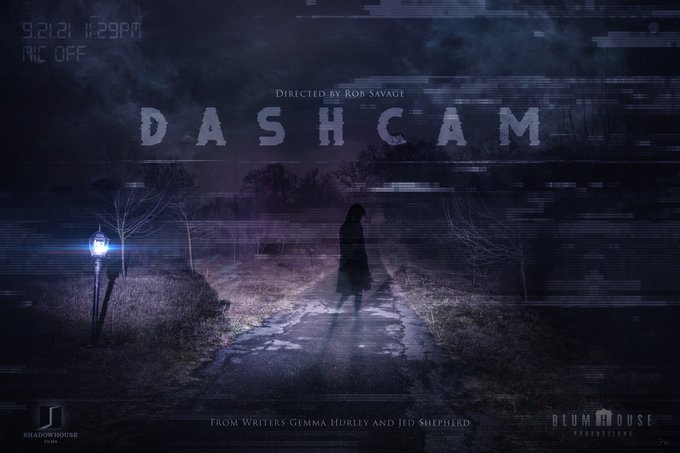Dashcam 2022 Movie Review
Waxing, waning COVID restrictions continue to force filmmakers to develop workarounds if they want to work at all. While one can admire their enterprise, it would be fibbing to pretend most such efforts to date have been very interesting as art or entertainment, beyond the novelty of whatever conceptual gimmick allowed them to keep cast and locations to a segregated minimum. An exception last year was streaming hit “Host,” which delivered a fun and scary ride despite the notion of a demonic presence invading a group Zoom call being similar to numerous other recent horror opuses. Its success was particularly notable since the film didn’t even quite reach feature length, clocking in at just under an hour.
Going for broke at a whole 77 minutes — well, if you count the whopping 11 dedicated to final credits — is “Dashcam,” which reunites director Rob Savage and his “Host” co-writers. Again, their hook is COVID-related, although rather than dealing with dutifully sequestered characters, the narrative this time is propelled by a noxious pandemic denier who flouts all contagion-prevention protocols.
Her heedless travel affords a bigger, more action-packed canvas here, albeit one still framed by a “found footage” gist — the film was shot by Savage and cast members (no DP is credited) on iPhones. That looser format brings mixed rewards, however, as “Dashcam” trades “Host’s” genuine creepiness for an in-ya-face hash of broad political satire, supernatural menace and near-incessant physical peril often rendered incoherent by the handheld camerawork. The result is at once fun and fatiguing. Scary it’s not, and many viewers will find their patience tested by the character they most hope will be dealt a quick demise being the one we’re principally stuck with.
Amid lines blurred between on-screen fiction and off-screen reality throughout, Los Angeles musician Annie Hardy plays herself, however cartoonishly exaggerated. She’s introduced in the act of livestreaming “Band Car,” an actual series billed as “the Internet’s #1 Live Improvised Music Show Broadcast From a Moving Vehicle.” It apparently consists of Hardy driving around, improvising raps to a synth groove as prompted by the stream of comments from her followers, occasionally interrupting that flow to yell at a passerby. This iteration of Hardy (who’s also fronted indie rock band Giant Drag since 2003) is funny in a crass, childish, scatological way, straddling the humorously bratty and the truly reactionary. By all evidence here, that tenor perfectly suits a fan base whose default response is “SHOW YER TITS.”
Unsurprisingly, this self-caricature is also a flaming libertarian-style opponent of all policies imposed by COVID, which she rants is some kind of fake-news conspiracy anyway. Proclaiming she’s “running away from the f—ing madness of America,” she boards a flight at a near-empty LAX, landing in the London home of former collaborator El Stretcho (Amar Chadha-Patel). Neither he nor his live-in girlfriend (Jemma Moore) are especially happy to host this surprise guest, who for the sake of her broadcast and “freedom” compounds offenses so fast she’s soon thrown out. As she sees it, it’s only fair that she should then steal their car.
While in possession of said wheels, Annie is asked to deliver a seemingly frail, mute older woman of color, Angela (Angela Enahoro), to a particular location. Enough money is proffered that our far-from-altruistic heroine agrees. But sickly Angela brings problems — first of a bodily fluids grossout ilk, then in ways alarming, homicidal and not very human. Eventually Stretcho shows up, having tracked his purloined vehicle. But he and Annie aren’t equipped to deal with the creature they’re saddled with, who proves an agent of grave harm to anyone crossing their collective path.
“Dashcam” doesn’t explain what’s happened to Angela, let alone what has got hold of her (suffice it to say one performer gets billed as The Parasite) or exactly what its powers are. But those powers are formidable, requiring deployment of VFX and stunt personnel. Together, those folk achieve some nice fantasy imagery within the film’s faux-live presentation.
Yet when one of Annie’s viewers texts, “I cant see what is happening,” we’re all too sympathetic to his complaint. As crisis piles upon crisis, with the performers holding cameras in all states of physical agitation, what we witness is too often just confusingly chaotic. A final stretch at a country estate introduces intriguing elements, but they too seem random and inexplicable. Then the narrative jerks to a halt, and we get many minutes of Hardy improvising amusingly juvenile raps in response to the closing cast and crew credits.
As a showcase for her, “Dashcam” may be a little too much of a good thing — she’s an acting natural, but this character is so vividly irksome it turns the whole film into a sort of deliberately off-putting standup routine. As sendup of the Trumpian belligerent-know-nothing politics that only heightened (and expanded well beyond the U.S.) during COVID, the effect is awfully broad as well as grating. While otherwise well-acted and crafted, Savage’s film is so dominated by this Gorgon persona, it can’t help feeling like an overextended comedy sketch. Where “Host” was short and sweet (as well as frightening), over-the-top “Dashcam” feels longer than the bare 66 minutes it logs pre-final credits. It’s a clever stunt — still, not so clever that it can’t wear out its welcome.




